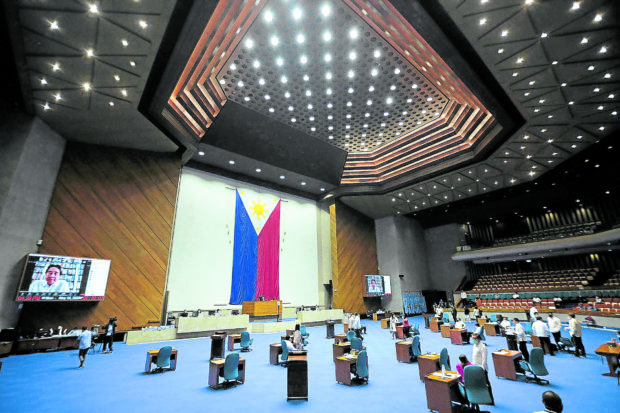
Plenary Hall of the House of Representatives. INQUIRER FILE PHOTO / GRIG C. MONTEGRANDE
MANILA, Philippines — The “real” state of the nation is that the country is “in a very bad shape,” House Minority Leader Joseph Stephen Paduano said Wednesday in response to President Rodrigo Duterte’s final State of the Nation Address (SONA).
In his “Kontra SONA” (counter SONA) speech–an annual tradition in the House of Representatives delivered by the lower chamber’s minority leader–Paduano touched on several issues faced by the country and the government such as the coronavirus pandemic, the controversial war against drugs, food security, and the education system, among others.
“The loss of lives and livelihood; the economic collapse; and the hard climb to recovery tell us only a thing–this country is in a very bad shape. It pains me so much to paint a gloomy picture of our country’s situation but this is the reality that we are facing,” Paduano said.
Failed to act promptly vs COVID-19
Paduano said that the country “failed to act promptly” against the coronavirus pandemic, saying that when the government acted on it, the virus has already spread.
As of July 28, there are 54,552 active COVID-19 cases in the country, with total cases standing at 1,566,667. Meanwhile, 1,484,714 have recovered while the death toll stands at 27,401.
“The great blunder we committed at the onset of the pandemic was very costly on the part of our economy. It also made us realize how weak our public health system is, as we witnessed the sufferings that our vulnerable population had to go through because of the mistake,” Paduano said.
The national government, Paduano said, also “miscalculated the tremendous negative effects” of the lockdowns imposed in various areas in the country such as unemployment and hunger.
Data from the Philippine Statistics Authority (PSA) show that unemployment rate in the country is at 7.7 percent, with 3.73 million Filipinos jobless. This number is lower than the 8.7 percent unemployment rate recorded in April.
Nonetheless, most of the Philippines’ neighbors had better jobless rates, based on latest data: China’s 3.9 percent in March; Indonesia, 6.3 percent as of February; Malaysia, 4.7 percent last March; Thailand, 1.9 percent as of October to December 2020; and Vietnam, 2.4 percent as of March, the National Economic and Development Authority’s report showed.
“These statistical data demonstrate the government’s failure to manage the health crisis without sacrificing the livelihood and economic opportunities for our people. Worse, amid lockdowns, the number of COVID infections in the country had continuously increased,” Paduano said.
Paduano likewise hit the slow distribution of the financial assistance for Filipinos affected by the pandemic as well as the delays in the provision of benefits to frontliners.
The minority leader also lamented the delays in the delivery of vaccines, saying that the national government is still has a long way to go before it reaches its inoculation target.
The Philippines is seen to be among the last countries in the region to be able to vaccinate 70% of its population to achieve the so-called herd immunity, according to a UK-based think tank.
National Task Force against COVID-19 deputy chief implementer Vince Dizon on Wednesday said that the Philippines so far has administered over 18.1 million COVID-19 vaccine doses, of which 11.3 million are first doses.
“The sluggish vaccine rollout in the country could also be attributed to the delays in the government’s decision to procure COVID shots and the approval to authorize LGUs and the private sector to buy their own vaccines,” Paduano said.
Moreover, Paduano questioned the “preferential priority of the national government on the mass inoculation,” a claim that vaccine czar Carlito Galvez Jr. has denied. Paduano, however, is not the first person to raise this issue.
Paduano’s colleague in the minority bloc in the House, Iloilo Rep. Janette Garin, earlier hit the supposed “palakasan”—or preference given to particular areas or individuals—in the distribution of COVID-19 vaccines in the country.
“Certainly, small municipalities and provinces need help. But how can they get the much-needed assistance if the government is so engrossed with Metro Manila?” Paduano said.
“A balance distribution of government resources and services between NCR and other regions is necessary if we want the mass inoculation program to succeed,” he added.
Drug war
While saying that the anti-illegal drugs campaign of the Duterte administration has “succeeded” in reducing the drugs and lowering crime rate in the country, Paduano said that impunity and police abuses “have turned out to be the downsides of the bloody drug war.”
A recent University of the Philippines study showed that the drug war has killed two persons a day.
“An immediate review by the Justice department of all cases involving ‘nanlaban’ suspects is necessary, not to discredit the ongoing drug campaign nor undermine the heroic deeds of our good policemen, but to give justice to the victims of frame-up and their families,” Paduano said.
Paduano said that complaints about police abuses—whether drug related or not—are alarming especially when many of these could not have been caught on camera.
“The Philippine National Police is among the most favored uniformed personnel of this administration. With increased salary and other benefits, the public expect them to pay back through honest and dedicated law enforcement work,” Paduano said.
“The President has asked Congress to pass a law extending free legal assistance to PNP personnel. We can support it only for good cops but it poses a danger of promoting impunity among bad cops. A lengthy debate on this proposal is expected,” he added.
RELATED STORY:
Duterte: For end of term, I have less visions, more remembrances